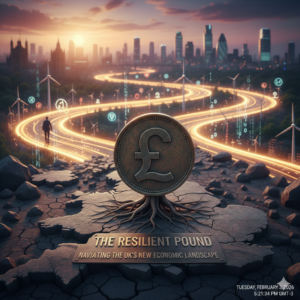
Learn to Take Charge of Your Credit and to Protect Your Financial Future
Credit cards can be powerful tools for building credit, racking up rewards and managing cash flow. But the wrong habits can quickly create expensive debt and financial stress — particularly here in the UK, where average household credit card balances are still high. This is a guide that will take you through some practical, no-bs tactics to help you manage your credit cards and not end up in debt in 2025.

💳 Learn How Credit Cards Work in the UK
You need to know a few terms before you can use your credit card responsibly:
- APR (Annual Percentage Rate): This will show you the true cost of borrowing if you don’t pay off the balance in full.
- Minimum Payment: The lowest payment you can make each month. You will end up paying more in interest by paying only this.
- Credit Limit: The most you are allowed to borrow on your card.
📌 Tip: Watch your credit card provider’s mobile app — most come with real-time balance monitoring and alerts.
✅ Pay Your Balance in Full Each Month
The best way to stay out of debt is to pay your full statement balance by the due date. This will prevent you from paying any interest and help with your credit score.
If you can’t afford to pay your bill in full, at a minimum pay more than the minimum, and figure out a strategy for bringing that balance down over time.
📆 Set Up Automatic Payments
f you fail to make payments, you may incur fees, interest and damage to your credit score. Do not fall for this by arranging a direct debit to automatically pay the minimum or full monthly out every month.
💡 Most UK banks provide ways to set up automatic payments from within their online banking.
🛒 Only Spend What You Can Afford to Pay Back
Operate your credit card like a debit card and don’t spend on your credit card what’s not already in your bank account. Your credit limit is not free money to spend with abandon; it is borrowed money that must be paid back.
Establish a weekly or monthly budget and adhere to it.
📉 Keep an Eye on Your Credit Utilisation
Preferably, your credit utilisation ratio (what you owe vs. what you could borrow) should not exceed 30%. For instance, if you have a credit limit of £2,000, try not to leave a balance of more than £600 on the card.
📲 You can see how much energy you’re actually using, and monitor your credit score for free with non-paying services such as ClearScore or Credit Karma UK.
🧠 Master the multiple card game
If you have more than one credit card, stay organized:
Allocate each card a purpose (e.g. one for groceries, one for travel)
Avoid maxing out any card
Monitor individual balances independently.
If you’re thinking about overspending, perhaps you should carry less plastic.
⚠️ Avoid Cash Advances
It is expensive to use your credit card to get cash from an ATM. You’ll pay hefty interest charges right away, with no grace period, and often be charged additional fees.
If it’s not an emergency, best to avoid this one entirely.
📲 Utilise Budgeting Tools & Alerts It has never been easier to monitor your spend, with all major banks offering budgeting tools and providing you with real-time alerts on all your accounts.
Use online tools:
- Create spending alerts through your card app
- Track your spending across all cards by using UK budgeting apps Emma, Snoop or Money Dashboard.
- Generate monthly financial reports to address habits and improve decisions
🎯 Conclusion: Responsible Credit Use = Financial Freedom
Credit cards can be a great friend or a money-sucking fomenter of financial and life woes, depending on how you use them. By paying your balances in full, keeping good tabs of your spending, staying below your credit limit and employing smart digital tools, you can reap all the advantages of a credit card without the pressure of debt.
Responsible lending The UK, with its volatile interest rates and the unpredictable cost of living, is a testament to why responsible credit management is such an important part of financial planning here. Learning to master these behaviors not only shields your financial future today, it also paves the way to establishing a solid credit file based on positive financial behaviors — good news for future aspirations, whether it’s homeownership, a loan or premium credit card offers.
Regain command over your credit with confidence. It’s not that you should shun credit — it’s that you should use it as judiciously as possible.
Our Post


The Resilient Pound: Navigating the UK’s New Economic Landscape


